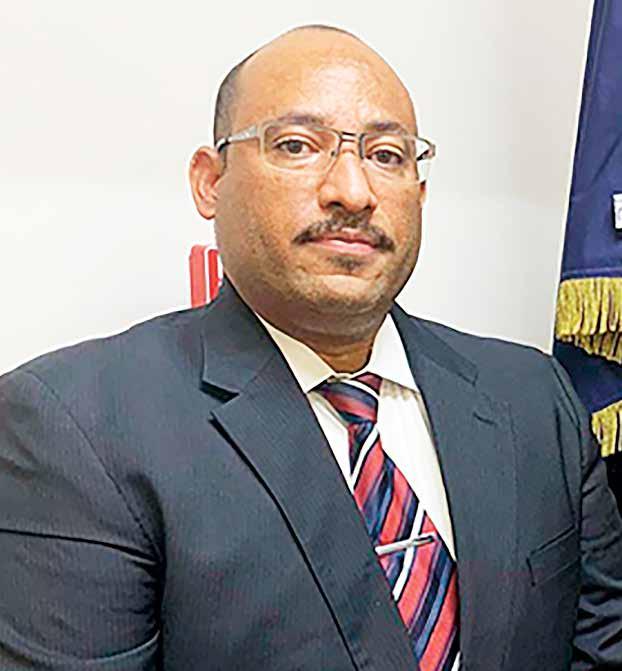
4 minute read
National Agriculture and Food Security Board to be established
BY OLIVIA ROSE
In an effort to boost food production in the TCI and lower the territory’s hefty food import bill, a National Agriculture and Food Security Board will soon be established.
This comes as the House of Assembly on Thursday, January 26, 2023, passed the Agriculture Regulations Bill 2023, to allow the establishment of the National Agriculture and Food Security Board.
The Board will be tasked with advising the Government on the development of an agriculture and food security plan for the Islands with a key role in the monitoring of the Agro-Incentive Programme established under the Department of Agriculture.
Minister of Tourism, Agriculture, Environment, Fisheries, and Marine Affairs, Hon Josephine Connolly presented the bill to the House of Assembly for debate.
During her contribution, Hon Connolly said her Government is committed to ensuring that the people of the Turks and Caicos Islands have access to a constant and nutritious supply of food, as well as reducing the food import bill and retaining money in the local economy.
She said: “Food security is the foundation of all human needs. Mr Speaker, given the threat of the global supply chain and the growing inaccessibility to enough nutritious food, the government, my government, is committed to putting in place a secure system to supplement the food requirements of our country.
“Mr Speaker, our priority is to provide an enabling environment to increase food production, promote sustainable use of agriculture, land, and fisheries resources, and facilitate local investment within the sector as outlined in our people's plan for empowerment.”
In order to achieve this, Cabinet at a meeting on July 7, 2021, granted approval to amend the existing Agriculture Ordinance 2012, and the agricultural policy 2018 to establish a national Food Security Board (FSB).
“The agriculture ordinance 2012 will be repealed and replaced by the agriculture regulation ordinance, which is presented today Mr Speaker, this bill…will seek to provide for the structure and functioning of the Department of Agriculture”, she added.
Connolly stressed that the Government found it necessary to repeal and replace the existing agriculture ordinance to rectify the “significant shortcomings” which did not adequately address the comprehensive needs or the development challenges of the agricultural sector.
She said: “This agriculture regulation ordinance presented today will fully address the role and functioning of the Department of Agriculture inclusive of the establishment and functioning of the National Food Security Board as well as the regulating of the farming sector.
“The legislation has to be amended to accommodate the structure, establishment, and function of the board.”
The Agriculture Minister told the House that the need for a board arises out of an increasing emphasis being placed on the department to address food security as a national priority.
As such, when the Board is established, members shall comprise people with the relevant technical skills and experience, Connolly stressed.
Board members will liaise with the Director of Agriculture to initiate and implement agriculture strategies to advance the agricultural industry and carry out specific tasks contained within the agricultural action plan.
This will include promoting the agricultural industry, planningrelated matters that could have an impact on the agriculture industry, developing regulations and developing education and health agendas.
All Island Representation
Leader of the Opposition Hon
Edwin Astwood, who supported the bill underscored that food security is a matter of national importance, and the board members should represent all islands.
He said: “It is not an issue that we should play political football with because our peoples’ food security is very important, and whatever one government did not get done, a next one should take up and do.”
The Opposition Leader suggested that the board be made up of representatives from each inhabited island within the Turks and Caicos chain.
“He said: “We know that we tend not to want to make boards very large, however, I think with this being so important, Mr Speaker, we should have a representative from …each of the five main islands.
“I think at least we should have a representative from each of those islands here on this board so we can see what agriculture practices best suit each island…for instance, there's nothing that stops us from doing hydroponics in the salt islands.”
He also opined that food merchants should also be represented on the board as they will be responsible for getting the goods directly to the consumers.
He said: “I don't know if the representative from the Hotel and Hospitality and Tourism Association will represent the store owners Mr Speaker if we're talking about food security, and getting our local products to our people via merchants, local businessmen, food providers, small stores, small and large stores, we should have a representative from them because they are going to be the ones getting the goods to market.”
Coupled with this, Astwood a former Minister of Health stressed that it is imperative for the board to be replete with a representative from the Department of Health to ensure locally produced food items meet the standards required for consumption.
He said: “Suppose we look to start doing eggs and all of a sudden none of the merchants or store owners want to take the local eggs because they think it is inferior quality..."
“So you cannot have a board regulating food production in the Turks and Caicos Islands and not have someone from the Health Department, whether it's people from environmental health to do food safety testing, of lettuce and sweet peppers, of the fertilisers etc.
“It's very complicated, Mr Speaker so you need persons with a technical background on these boards.
Regional Partnerships
Governor’s Appointed Member Hon Willin Belliard during his contribution to the Bill, suggested that local farmers should be incentivised to foster more partnerships with regional suppliers.


He said: “We also need to accept that there will be some food items that we will not be able to produce in the Turks and Caicos for example, rice.
“Also there will be a long time before we are able to produce sufficient livestock to supply the market of these islands, especially in the vibrant tourism sector that we have in Providenciales.
“For those areas where we are not able to produce locally, I think we need to provide the necessary incentive to our farmers so that they can partner with regional suppliers and regional producers so that those items can be brought into the islands at an affordable price.
He added that while the government may not be able to force the supermarkets to buy those items, he feels that the elimination of duties and tariffs will make the items very competitive.










